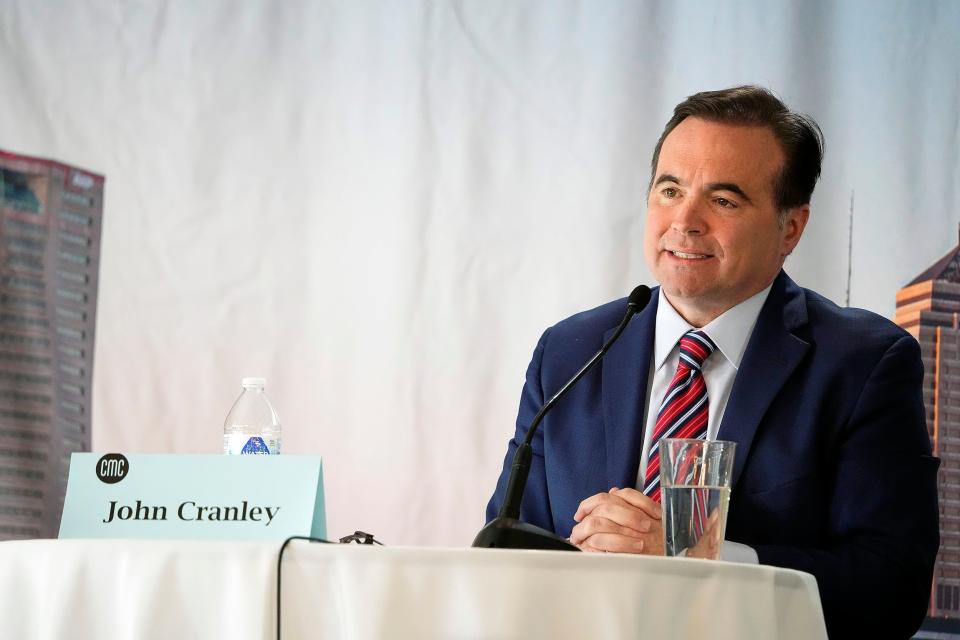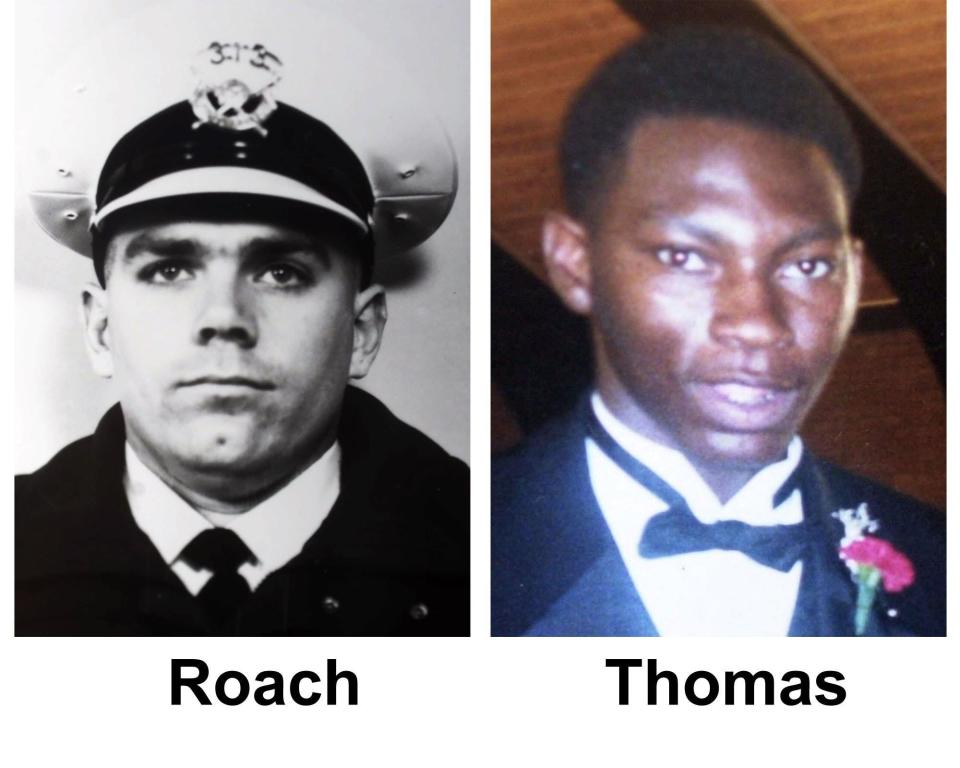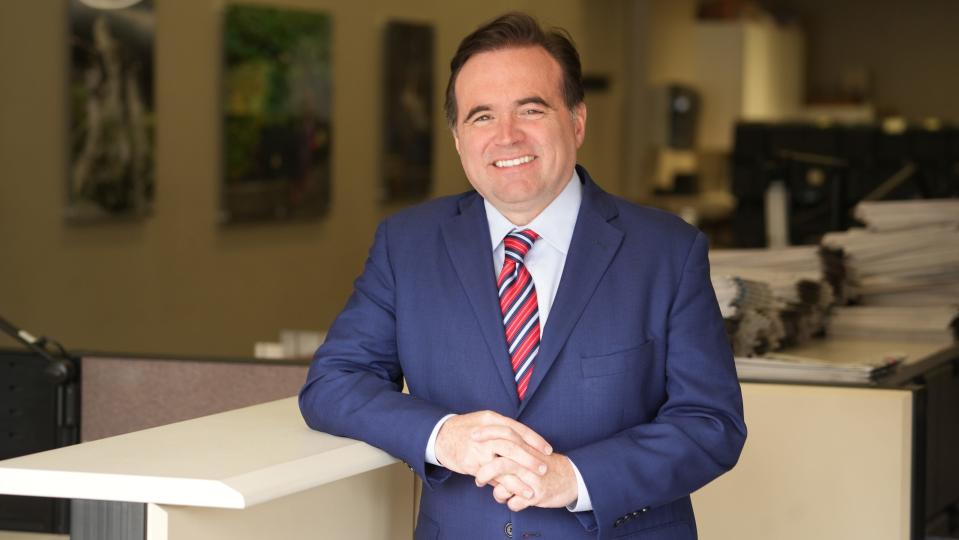Gov. candidate John Cranley: Under Dewine, Ohio's middle class shrinking, young unwelcomed
- Oops!Something went wrong.Please try again later.
- Oops!Something went wrong.Please try again later.
- Oops!Something went wrong.Please try again later.
Ahead of the May 3 primary, all major candidates for Ohio governor were invited to sit down with the Columbus Dispatch editorial board and other journalists from our newsroom and the USA TODAY Ohio Bureau.
Businessman Jim Renacci, a Republican, and Democratic primary candidates Nan Whaley, the former mayor of Dayton, and John Cranley, the former mayor of Cincinnati, agreed to share their thoughts during hour-long interviews.
If successful in his bid to be Ohio's next governor, former Cincinnati mayor John Cranley knows chances are almost certain he will have to work with a GOP-dominated General Assembly that at times has rejected Mike DeWine — the state's current governor and a Republican — as too liberal on some issues.
>>NAN WHALEY: Mike DeWine far too 'terrified' of extremists, losing power to lead Ohio
>> JIM RENACCI: Ohio a failing state that young people don't want to live in
Cranley, who must first face former Dayton Mayor Nan Whaley in Tuesday's Democratic primary election, says he has experience working across the political aisle to get things done.

"(Most of my) major accomplishments, including being the only comeback city in Ohio, were bipartisan in nature," he told our editorial board. "Just in 2020, I convinced very right-wing state reps, Bill Seitz and Tom Brinkman, to endorse a tax levy in Hamilton County to increase public transit. That's the kind of bipartisan results that I've got."
Ready to 'hell no' for human rights
Still Cranley, Cincinnati's mayor from 2013 until earlier this year, said he has "no problem saying 'no.'"
"I vetoed more bills as mayor than all of my predecessors combined times two. So when this legislature comes (for) women's rights, comes (for) gay rights, civil rights, voting rights, I will say 'hell no," the 47-year-old said.
"There is no compromise on human rights and individual rights, but there will be compromise to grow the economy."
Bipartisan agenda
Sign up for our opinion newsletter
Email newsletter:: How to get the Columbus Conversations newsletter
Cranley, who has an undergraduate degree from John Carroll University and is a Harvard Law School and Harvard Divinity School graduate, says his growth and diversity and inclusion record outpaces DeWine's.
"Mike DeWine and the Republicans have been running the state for the last 35, 40 years and the middle class has been shrinking in Ohio. Young people are fleeing," he said.
The killing of 19-year-old Timothy Thomas, a Black man, by a white Cincinnati police officer led to civil unrest in the city 21 years ago.
Thomas was the 15th Black person to die in confrontations with Cincinnati police between 1995 and 2001.
More: Being Timothy Thomas' son
Civil rights leaders called for boycotts. Shows, conventions and other events were canceled in Cincinnati.
Cranley, head of city council's Law and Public Safety Committee, when Thomas was killed, said the city took a hit, but is making a comeback.

"Now (Cincinnati is) growing again twice as fast as the state of Ohio. It reduced poverty one and a half times faster than the state of Ohio," Cranley said. "We have more Black-owned businesses that make more than a half million dollars a year than any city in Ohio."

Like Whaley, Cranley says he is pleased Columbus is growing and is an economic success story, but he says that prosperity should reach other parts of Ohio as well.
He told our board that Ohio's governor should consider the needs of all Ohioans and that his agenda was designed to appeal across the aisle.
Things like improved K-12 education and Wi-Fi and cellular service are desirable by Ohioans that live in cities and Republican-represented rural communities, Cranley said.
And he says more members of both the Republican and Democratic parties have changed their minds and now favor legalizing marijuana here.
Marijuana and economics
Speaking of marijuana, Cranley wants to legalize recreational marijuana and impose a 10% excise tax in addition to state and local sales taxes on the drug.
"We will create 30,000 new good-paying jobs that pay $60,000 a year to build roads and broadband and a new energy economy," he said.
More: Marijuana legalization in Ohio faces tricky path to November ballot
Critics say Cranley's plan is pie-in-the-sky, but his team says it is backed up by studies from the Drug Enforcement and Policy Center at Ohio State University.
Opinion: 'Wake up and recognize the change that needs to happen with the CPD'
Cranley, who says he experimented with marijuana when he was 21, says those critical of his plan typically fall in to one of two categories: they are like Whaley and "lack hope" and haven't experienced a comeback or are like DeWine and think it should be criminalized.
"I think it should be a business," Cranley said. "Too many people, especially in our minority communities have lost career opportunities because of a marijuana-use conviction."
He says Cincinnati decriminalized marijuana and paid to help people get pot-related charges expunged from criminal records.
Shining the light
During our time with him, Cranley was critical of DeWine's handling of the COVID-19 pandemic, particularly that the governor closed polling locations hours before the March 2020 primary and did not push for summer school for children who lost learning time when he closed schools.
Cranley called out what he sees as failures of transparency from the state.
For example, he says not enough is known about the $2 billion in incentives the state is giving Intel. The company plans to spend $20 billion for computer chip manufacturing plants planned for Licking County.
More: Ohio just landed huge Intel deal. Does that mean JobsOhio is working?
"Where are they getting that money from?" he asked. "Are they cutting K through 12 education? Are they cutting Obamacare? What are they doing? Money doesn't grow on trees. Of course we want those jobs, but at what price?"
More: Renacci: 'Boondoggling' JobsOhio a failed experiment that needs to end now
Cranley says the public also deserves more information about JobsOhio, a private nonprofit economic development organization created by the state a decade ago.
JobsOhio has been credited with helping land the Intel deal, but Cranley says it operates too deep in the shadows.
Officials use public money as if it belongs to them and not the people, he said.
"Let the sun shine in," Cranley told us. "Let people have regular accounting of our dollars because these are our dollars."
More: JobsOhio celebrates 10 years; looks to the future to help pull Ohio out of the pandemic

What Ohioans want
Cranley said Ohioans in places other than Cincinnati and Columbus are experiencing despair. He says he offers the hope Ohioans want.
"We're the state of John Glenn, Armstrong. The state of Toni Morrison and Jesse Owens. The state of Thomas Edison and the Wright brothers," he said. "The future used to happen in Ohio. It can happen in Ohio again." DeWine and his fellow Republicans have only offered Ohioans corruption and divisive laws, Cranley says.
More: Porteous: Ohio wants to erase me from my daughter’s mind, memory and classroom |Opinion
"Their solution to inflation is to raise people's utility bills, to keep gas taxes high and to pass socially divisive policies like stand your ground or permit-less carry that drives young people (from the) state," he said. "It makes people feel unwelcomed."
This piece was written by Opinion Editor Amelia Robinson on behalf of the Columbus Dispatch Editorial Board.
This article originally appeared on The Columbus Dispatch: Who is John Cranley and why is he running for Ohio governor? Election-2022

